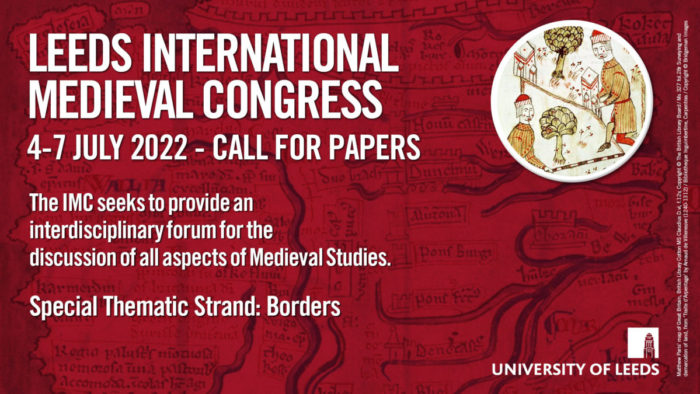IMC 2022
About IMC 2022
IMC 2022 was the first fully hybrid International Medieval Congress. Following the cancellation of IMC 2020, the Special Thematic Focus was 'Borders'. It was held between Monday 4 - Thursday 7 July 2022 both in-person here in Leeds and virtually.
Conference Programme
- Browse by timeslot
- Browse by sessions
- Browse by keywords
- Browse by strands
- Browse by sponsors
- Browse by participants
You can also download the archived PDF programme for IMC 2022 here.
Call for Papers
The IMC provides an interdisciplinary forum for the discussion of all aspects of Medieval Studies. Proposals on any topic related to the Middle Ages are welcome, while every year the IMC also chooses a special thematic focus. In 2022 this was ‘Borders’.
Medieval borders have preoccupied scholars for several decades in various guises. The term ‘border’ designates a wide variety of phenomena: physical geographical limits, that can be signalled by border markers or natural features, points where toll has to be paid, political boundaries, that vary from points in space to linear and fortified military fronts, ways of controlling space, frontier zones, borderlands, porous zones of encounters and contact, ways of limiting community and identity, ideological and metaphorical delimitation including discourse and representation, bordering practices, the process of creating and performing borders, and borderscapes to capture fluidity and change over time.
This strand seeks to bring together medievalists of all fields interested in both the theory and practice of borders in all their variety, from physical boundaries and material borders to dynamic social and spatial relationships. Borders can be linked to power and the formation of states, to definitions of self and other, to violence and military engagement, to belonging and becoming, to material and symbolic construction, to relational and perspectival production of space, to mapping and discourse, to experience and theory, to negotiation and performance. Borders can also be found in frescoes, textiles, clothing, ceramics or coins, with practical, symbolic or aesthetic functions. Borders are also subject to evolution and significant change over time not just between the medieval and modern, but within the medieval period.
Themes to be addressed may include, but are not limited to:
- Political and military borders
- Living in border zones
- Medieval and Modern perceptions, descriptions, and conceptualizations of borders
- Delimiting borders, border markers
- Border maintenance
- Encountering and experiencing borders
- Bordering practices
- Borderscapes in the longue durée
- Symbolic borders
- Belonging and exclusion
- Mapping borders and border zones
- Border institutions
- Materiality of borders
- Border and power
- Migration
- Medieval imagery of borders
- Transnationalism
- Political, social, cultural, religious performance of borders
- Village and parish boundaries
- Boundaries between town and countryside and within towns
- Practices of delimitation
- Blurring boundaries such as human/animal, animate/inanimate, gender, age, status, religion
- Self and other, boundaries of the self
- Fluidity and fixity of borders
- Borders in manuscripts
- Material and visual borders
- Processual and performative turns and medieval borders
- Disciplinary boundaries
- Paratexts as borders
- Borders of the body
- Transcending and reaffirming boundaries between life and death
- Borders, boundaries, frontiers
The IMC welcomes session and paper proposals submitted in all major languages, as well as virtual, hybrid, and in-person sessions.
The Special Thematic Strand ‘Borders' was co-ordinated by Nora Berend (Faculty of History / St Catherine’s College, University of Cambridge).

